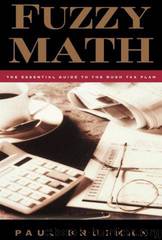Fuzzy Math by Paul Krugman

Author:Paul Krugman [Krugman, Paul]
Language: eng
Format: epub, mobi
Publisher: W.W. Norton
Published: 2012-01-04T03:07:36+00:00
A Peculiar Definition of Unchanged Policy
Of that $5.6 trillion surplus projection, a little more than half—$2.9 trillion—consists of the surpluses that the CBO expects the Social Security and Medicare systems to run. (Medicare is running a surplus for the same reason that Social Security is—as a program that receives money from workers and pays benefits to retirees, it is trying to make provisions for the coming wave of retiring baby boomers.) As we’ve seen, those surpluses are in a fundamental sense not really surpluses, because they are necessary preparations for the coming demographic deluge. But while nobody doubts that the CBO forecast there will turn out to be wrong, not many experts have asserted that it is strongly biased one way or the other.
The rest of the projection, however, is a different matter. Here the CBO’s notion of current policy looks to outside observers, myself included, like a radical downsizing of government over the next decade. This might happen, though it seems unlikely; the point is that the CBO is supposed to project what would happen if the federal government continues to do more or less what it does now, not to build in a radical policy change.
The way the CBO defines “maintaining current policy” is to assume that there is no change in real discretionary spending. That is, it assumes that keeping the role of government unchanged would mean keeping the number of dollars spent on things other than Social Security and Medicare unchanged after adjusting for inflation.
To see why this is an unreasonable way to define current policy, consider one example of a government program: air traffic control. Suppose that the federal government were to keep real spending on air traffic control constant for the next ten years, so that the number of controllers and the capacity of the radar systems stayed the same for a decade. Would that feel like no change in policy, like a government whose role in the economy had not changed?
Of course not. It would feel like a drastic cut in government services, because the same number of air traffic controllers would have to manage a greatly increased volume of air traffic. And air traffic is not a special case: just about everything that the government deals with will require more resources in order to maintain the current level of government services, because we are a growing country with a growing economy. (And when it comes to defense spending, our potential adversaries are also growing countries with growing economies.)
Even a highly conservative definition of maintaining current policy would be one under which real spending per capita remains unchanged. The U.S. population is expected to grow about 10 percent over the next decade, so the CBO’s projection assumes a 10 percent decline in real per capita spending. Many economists would go further and argue that a truly reasonable definition of unchanged policy would be one in which spending remained constant as a percentage of GDP; by contrast, the CBO projection assumes a 25 percent decline in that percentage.
Download
This site does not store any files on its server. We only index and link to content provided by other sites. Please contact the content providers to delete copyright contents if any and email us, we'll remove relevant links or contents immediately.
Harry Potter and the Goblet Of Fire by J.K. Rowling(3025)
Never by Ken Follett(2873)
Shadow of Night by Deborah Harkness(2710)
Ogilvy on Advertising by David Ogilvy(2677)
Zero to IPO: Over $1 Trillion of Actionable Advice from the World's Most Successful Entrepreneurs by Frederic Kerrest(2375)
The Man Who Died Twice by Richard Osman(2290)
Machine Learning at Scale with H2O by Gregory Keys | David Whiting(2265)
Book of Life by Deborah Harkness(2259)
How Proust Can Change Your Life by Alain De Botton(2256)
My Brilliant Friend by Elena Ferrante(2218)
0041152001443424520 .pdf by Unknown(2214)
The Tipping Point by Malcolm Gladwell(2200)
How to Pay Zero Taxes, 2018 by Jeff A. Schnepper(2095)
Will by Will Smith(2033)
Purple Hibiscus by Chimamanda Ngozi Adichie(1978)
Hooked: A Dark, Contemporary Romance (Never After Series) by Emily McIntire(1932)
Borders by unknow(1779)
Rationality by Steven Pinker(1761)
Daughter of Smoke and Bone by Laini Taylor(1737)
